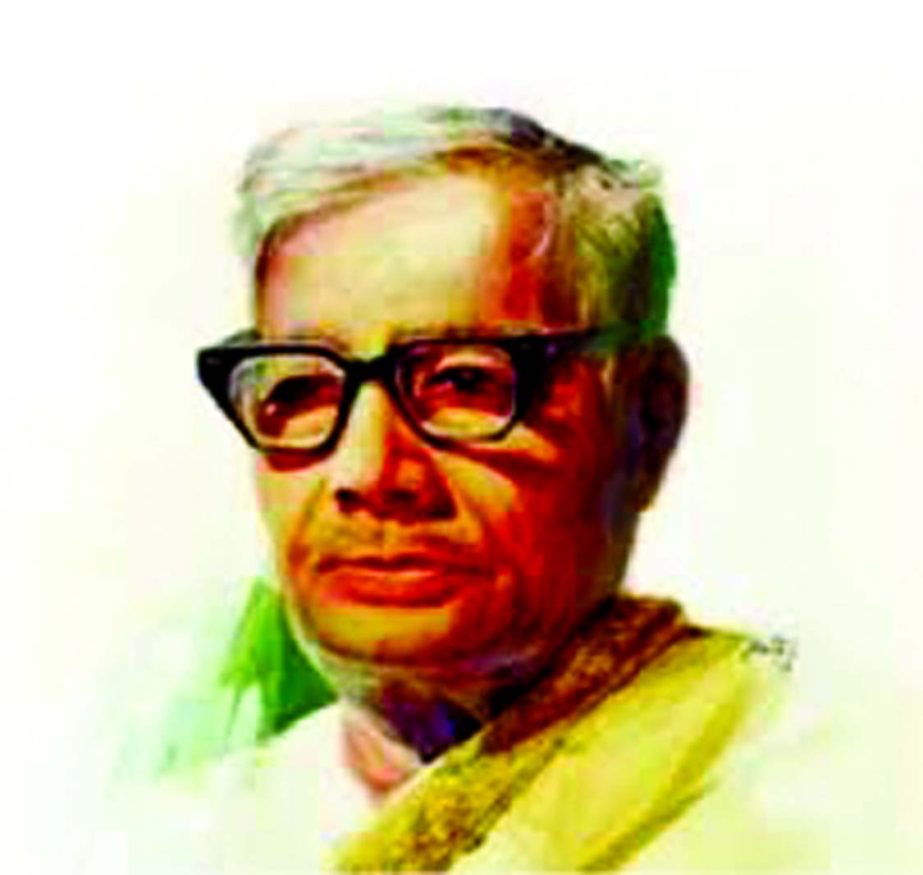
Bimal Guha
Jasim Uddin (1903-1976) poet and litterateur, was born on 1 January 1903 in his maternal uncle’s home at Tambulkhana in Faridpur. His father Ansaruddin Mollah was a teacher at school. Jasim Uddin studied for some time at Faridpur Welfare School. He then went to Faridpur Zila School, wherefrom he Matriculated in 1921. He completed IA from Rajendra College in 1924, and BA and MA in Bangla from the University of Calcutta in 1929 and 1931 respectively.
From 1931 to 1937, Jasim Uddin worked as Ramtanu Lahiri Assistant Research Fellow under Dinesh Chandra Sen, collecting folk literature. In 1938 he joined the University of Dhaka as a lecturer. He left the University in 1944 to join the Department of Information and Broadcasting. He continued working in Broadcasting, first under the Bengal government and then under the East Pakistan Government, until his retirement as Deputy Director in 1962.
Jasim Uddin’s talent as a poet developed early. As a college student, he wrote the poem ‘Kobor’ (Grave). The poem, a dramatic monologue of an old man talking to his grandson in front of his wife’s grave, was included in school textbooks while Jasim Uddin was still a student at University.
Jasim Uddin’s first book of verse, Rakhali (Shepherd), was published in 1927. His other books are Noksi Kanthar Math (1929), Sojan Badiyar Ghat (1933), Rongila Nayer Majhi (1935), Matir Kanna (1951), Suchoyoni (1961), Padma Nodir Deshe (1969), Bhoyaboho Sei Dingulite (1962), Padmapar (1950), Beder Meye (1951), Pollibodhu (1956), Gramer Maya (1959), Thakur Barir Anginay (1961), Germanir Shohore Bondore (1975), Smoroner Soroni Bahi (1978), Bangalir Hasir Golpo, Dalim Kumar etc. He also wrote a novel, Boba Kahini (1964). He edited two books on folk music : Jarigan (1968) and Murshida Gan (1977). Noksi Kanthar Math and Bangalir Hasir Golpo have been translated into English as The Field of the Embroidered Quilt and Folk Tales of East Pakistan respectively.
Called ‘Palli Kobi’ (folk poet), Jasim Uddin is the poet of rural Bengal, depicting the natural beauty of the rural world as well as the lives and sensibilities of village people. His poetic rhythms are drawn from folk poetry, easy on the ear and quick to put them in memory. He was also a writer of fine prose, fluent, witty, and expressive.
Jasim Uddin was one of the pioneers of the progressive and non-communal cultural movement. He was an ardent supporter of Socialism and of Bengali nationalism. In the 1950s when the government of Pakistan attempted to stop broadcasting Tagore songs, he protested boldly.
In 1969, Jasim Uddin was awarded the D. Litt by Rabindra Bharati University. He also won several awards, including the President’s Award for Pride of Performance (1958), Ekushey Padak (1976) and Swadhinata Dibas Puruskar (posthumous, 1978). In 1974 he was also selected for the Bangla Academy Award, but he refused to accept it obviously on ground of recognizing his contributions much earlier.
Jasim Uddin died in Dhaka on 13 March 1976 and was buried in his own village. n
Jasim Uddin (1903-1976) poet and litterateur, was born on 1 January 1903 in his maternal uncle’s home at Tambulkhana in Faridpur. His father Ansaruddin Mollah was a teacher at school. Jasim Uddin studied for some time at Faridpur Welfare School. He then went to Faridpur Zila School, wherefrom he Matriculated in 1921. He completed IA from Rajendra College in 1924, and BA and MA in Bangla from the University of Calcutta in 1929 and 1931 respectively.
From 1931 to 1937, Jasim Uddin worked as Ramtanu Lahiri Assistant Research Fellow under Dinesh Chandra Sen, collecting folk literature. In 1938 he joined the University of Dhaka as a lecturer. He left the University in 1944 to join the Department of Information and Broadcasting. He continued working in Broadcasting, first under the Bengal government and then under the East Pakistan Government, until his retirement as Deputy Director in 1962.
Jasim Uddin’s talent as a poet developed early. As a college student, he wrote the poem ‘Kobor’ (Grave). The poem, a dramatic monologue of an old man talking to his grandson in front of his wife’s grave, was included in school textbooks while Jasim Uddin was still a student at University.
Jasim Uddin’s first book of verse, Rakhali (Shepherd), was published in 1927. His other books are Noksi Kanthar Math (1929), Sojan Badiyar Ghat (1933), Rongila Nayer Majhi (1935), Matir Kanna (1951), Suchoyoni (1961), Padma Nodir Deshe (1969), Bhoyaboho Sei Dingulite (1962), Padmapar (1950), Beder Meye (1951), Pollibodhu (1956), Gramer Maya (1959), Thakur Barir Anginay (1961), Germanir Shohore Bondore (1975), Smoroner Soroni Bahi (1978), Bangalir Hasir Golpo, Dalim Kumar etc. He also wrote a novel, Boba Kahini (1964). He edited two books on folk music : Jarigan (1968) and Murshida Gan (1977). Noksi Kanthar Math and Bangalir Hasir Golpo have been translated into English as The Field of the Embroidered Quilt and Folk Tales of East Pakistan respectively.
Called ‘Palli Kobi’ (folk poet), Jasim Uddin is the poet of rural Bengal, depicting the natural beauty of the rural world as well as the lives and sensibilities of village people. His poetic rhythms are drawn from folk poetry, easy on the ear and quick to put them in memory. He was also a writer of fine prose, fluent, witty, and expressive.
Jasim Uddin was one of the pioneers of the progressive and non-communal cultural movement. He was an ardent supporter of Socialism and of Bengali nationalism. In the 1950s when the government of Pakistan attempted to stop broadcasting Tagore songs, he protested boldly.
In 1969, Jasim Uddin was awarded the D. Litt by Rabindra Bharati University. He also won several awards, including the President’s Award for Pride of Performance (1958), Ekushey Padak (1976) and Swadhinata Dibas Puruskar (posthumous, 1978). In 1974 he was also selected for the Bangla Academy Award, but he refused to accept it obviously on ground of recognizing his contributions much earlier.
Jasim Uddin died in Dhaka on 13 March 1976 and was buried in his own village. n

